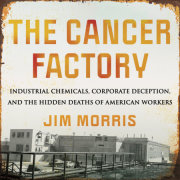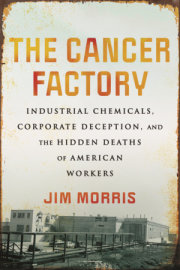“A devastating and thorough critique of corporate greed, deception, and lack of concern for worker health.”
—Publishers Weekly, Starred Review
“Heartbreaking and infuriating, Morris’ storytelling jars the reader out of complacency. With luck, The Cancer Factory can also be an instrument for change.”
—BookPage, Starred Review
“A powerful indictment of corporate greed and regulatory laxity and a moving commentary on its human costs.”
—Kirkus Reviews
“Morris’s chronicle vividly reveals the dangers of cancer, birth defects, and other health complications in chemical factories while holding out hope for change for the better in spite of polarized politics and corporate influence.”
—Booklist
“Heartbreaking and infuriating, Morris’ storytelling jars the reader out of complacency. With luck, The Cancer Factory can also be an instrument for change.”
—Deborah Mason, BookPage
“The lack of response to known problems is the shock of The Cancer Factory. Morris...skillfully weaves together voices of cross-generational workers, their families, and their advocates, never sugarcoating the harrowing details of factory conditions or the painful consequences of urethral tests and cancer treatments.”
—Anna Young, Harvard Public Health
“Morris’s book offers a chilling account of alleged corporate negligence, emphasizing the need for continuous vigilance to protect workers’ health and safety. It is a wakeup call for professionals in the field, urging them to remain steadfast in their pursuit of a safer working environment for all.”
—Shane Mercer, Canadian Occupational Safety
“Morris’ clear and compelling prose, empathetic and clear-eyed telling of these devastating stories, as well as his deft ability to combine them with the larger story of how we got here, make this a book that every business school, medical school, and public health student should read, along with corporate lawyers, government policymakers, business leaders and health care providers.”
—Marianne Sullivan, New Solutions Journal
“No journalist knows more about toxic chemicals in the workplace than Jim Morris. The Cancer Factory is the crowning achievement of his estimable career spent walking fence lines, factory floors, and doctor’s offices. By the time you’ve finished it, you will not only know why manufacturers and the government have failed abjectly to protect workers; you will also understand the terrible consequences of their neglect.”
—Dan Fagin, author of the Pulitzer Prize–winning Toms River
“The Cancer Factory could not come at a better time, as we reckon with how our bodies pay the price for our nation’s toxic history and as today’s workers fight not for only their rights but for their very lives. In telling the breathtaking story of the Goodyear workers, Jim Morris writes with passion, precision, and moral clarity. He shows how the devastation in Niagara Falls is part of a much larger systemic failure to value people over profits—and what it will take to create a more just future. A powerful and essential read.”
—Anna Clark, author of The Poisoned City
“Veteran journalist Jim Morris has written a must-read chronicle of how DuPont and other chemical manufacturers conceal information about the hazards of the chemicals they manufacture, then deny responsibility when exposure to their products destroys lives and devastates families. It is a terrific book.”
—David Michaels, former head of the Occupational Safety and Health Administration and author of The Triumph of Doubt
“The Cancer Factory is the book Jim Morris was meant to write, the culmination of decades of dogged reporting on the slow-motion disaster of occupational disease. Morris deftly weaves together a shameful history of corporate deception, regulatory failures, and political cowardice with an intimate accounting of the devastating consequences for workers. He writes with restrained outrage of the damning evidence he has unearthed and with deep empathy for the mechanics, technicians, stonecutters, lawyers, physicians, and scientists pressing for justice. By illuminating a dark corner of American industry—one that receives far too little attention, even as laborers continue to die from long-known hazards while facing an onslaught of novel poisons—Morris has done a great public service.”
—Chris Hamby, Pulitzer Prize–winning investigative reporter for the New York Times and author of Soul Full of Coal Dust






